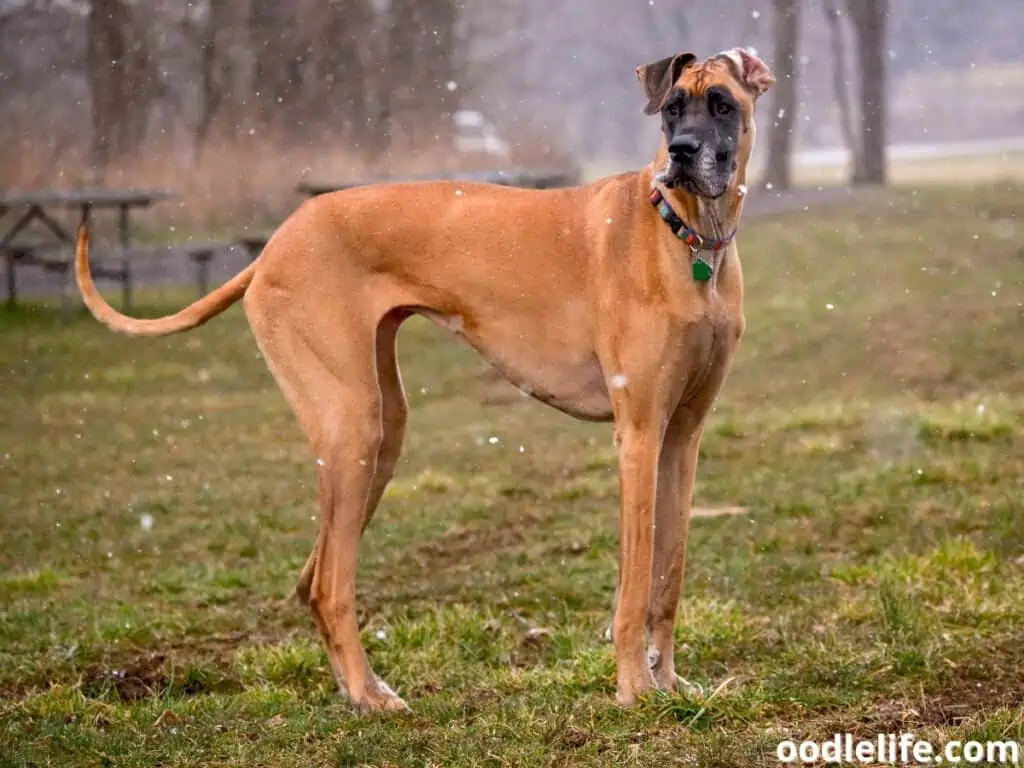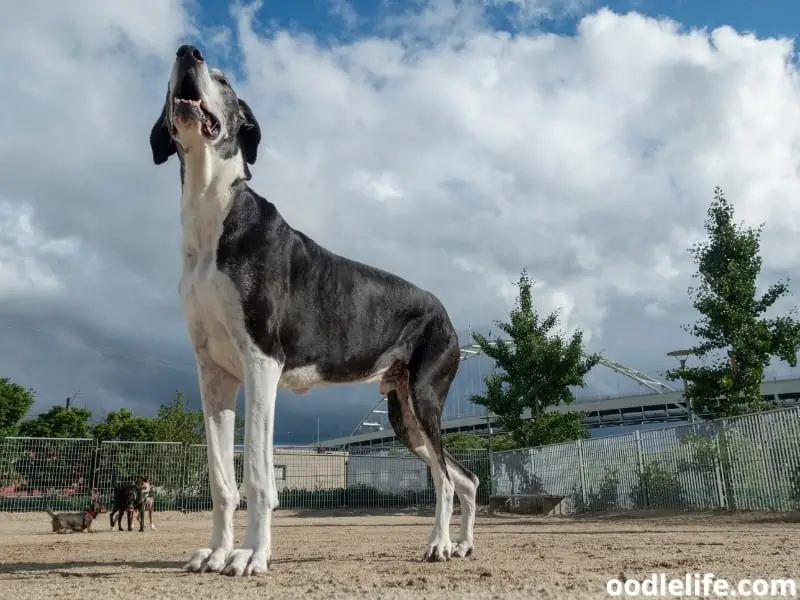Do Great Danes Bark a Lot? [Help]
Great Danes are one type of dog notorious for their size and the loud bark that comes with it. Excessive barking is a headache for many dog owners, so if you’re thinking about getting a Great Dane but wonder if great Danes bark a lot, you’re not alone.
This guide to “Do Great Danes Bark a Lot” digs into everything you need to know about why dogs bark and what that means for Great Dane owners.

Do Great Danes Bark a Lot?
Some people might think that all Great Danes bark a lot, but that’s not *entirely* true.
Great Danes are notoriously vocal – but while some of them may be prone to barking more than others, it really just depends on the individual dog and how they’re raised.
Great Danes will bark when hungry, bored or lonely, when they spot something outside, and when they want to go out for a walk. They are not afraid to communicate. If you are looking for a dog that is quiet as a mouse – this is NOT the breed for you.
With that all said, Great Dane barking can be controlled through training and proper discipline, so don’t let this one trait discourage you from the GIANT dog lifestyle.
What Makes A Great Dane Great [and vocal]?
The size of Great Danes makes them hard to miss, and consequently, they are one of the most infamous dog breeds around. Understanding the origins of the Great Dane breed can help increase your understanding of this type of dog and also help pinpoint why they might be barking.

Geographic Origins
Great Dane comes from a French version of the breed name Grand Danois, which translates as Big Danish in English. That said, Great Danes are not affiliated with the country of Denmark, its history, or its originating location. Great Danes are a cross between English Mastiffs and Irish Wolfhounds, with records tracing back to ancient Egypt .
Ancient depictions in Egyptian, Tibetan, and Chinese writing suggest that a dog species lived in these regions thousands of years ago. Images from these regions greatly resembled the Great Dane.
However, the modern history of the Great Dane traces its origins back to Germany. In modern Germany, Great Danes were first bred to protect the estates of German nobility and hunt wild boars.
Great Danes became extremely popular in Germany, where they became known as Deutsche Dogge or Kammerhunde, which means “Chamber Dog.” By the mid-1700s, Great Danes were the hallmark dog breed of noble estate homes and country carriages.
The size of these Mastiff-like dogs also made them popular among hunters, as few other dog breeds could reliably help hunt and bring down wild boar.
Lifespan and Aging and Barking

Great Danes are a dog breed that does not live as long as others, with dogs living, on average, for only 6-8 years. Some individuals will live longer than average, with some lucky dogs surviving until age 12. However, these dogs are rare as less than 20% of Great Danes live for more than 10 years.
Aging is not commonly known to affect the barking of Great Danes but can impact their appearance and, quite often, their ability to move.
Appearance
Sometimes called the “Apollo of dogs,” the size of Great Danes earns them widespread recognition. As the tallest dog breed meant for work, Great Danes measure as high as 32 inches at their shoulder and are taller than many humans when they stand on their hind legs.
With the average male weighing approximately 100-120 pounds, Great Danes are fully grown when they are 18-24 months old. However, it is essential to watch your dog for excessive growth early on which can cause health problems.
Great Danes come in a range of colors and with unique and diverse markings. Some professional Great Dane organizations list ten or more official colors for the breed, with at least three variations of standard markings. Some of these organizations warn against breeding select colors of Great Dane, white, for example, as it can result in excessive health problems for the animal.
Dogs and Barking
The sometimes incessant barking of some dog species is just one reason many people self-declare as cat people. However, the reason dogs bark and how to tell when the barking is out of control can differ and vary among dogs and pet owners alike. Understanding why dogs begin to bark can radically improve your life as a pet owner and the lives of anyone who lives within barking distance.
Why Do Dogs Bark?
Dogs use different types of barking to communicate a variety of things. For dogs, barking serves an essential function as their way of communicating. Training and managing barking behaviors when your dog is young can help manage the long-term behavioral expectations you have for your dog.

Territorial or Alarm Barking
Dogs that bark out of alarm tend to act more stiffly and may bark at anything coming into view. Dogs that engage in territorial barking may also bark at multiple things. However, this type of barking occurs when they feel their territory is under threat.
The main difference is that dogs alarm bark in any location at all. Territorial barking is different and happens when your dog feels the need to protect an area that is familiar to them.
Greeting or Socially Facilitated Barking
If your dog is extra social, they may participate in greeting-barking, where they bark to greet people or other dogs, usually in an excited manner that may also involve whining. Socially facilitated barking usually sounds a little different and happens when dogs bark when they hear other dogs barking, even from a distance.
Why Do Dogs Bark a Lot?
If your dog is barking a lot, it could be that they are frustrated, in need of attention, or have a compulsion. If your dog is tied up or can hear they are being blocked from an opportunity to play with animals, they may begin to bark out of frustration. Some of these behaviors are habitual but some are natural and owners should aim to decrease rather than eliminate their dog’s barking.

Do Great Danes Bark a Lot?
Most Great Danes do not bark at things that frustrate them, but they can develop barking as a habit if not kept in check. If Great Danes are allowed to bark out of habit, they can develop behaviors like barking to receive attention or compulsive barking.
Knowing and planning to manage how, when, and what your dog barks at can help build and encourage behaviors that won’t have your dog barking at all hours.
As such a large species, Great Danes are confident and friendly which can also make them very loud if their barking is not under control.
As a hunting dog breed, Great Danes sometimes bark out of alarm or to alert their owners to something unknown or that could be a potential threat. While Great Danes are not inherently aggressive, this type of alert or alarm-based barking can help deter intruders and keep owners feeling safe and secure.
A majority of Great Danes do not bark at nuisances or things that annoy them, but they can be vocal in other ways. Great Danes may be considered to be a vocal breed of dog as they yawn and imitate sounds that seem like humans talking. Barking can be confused with this type of vocalization even though both are fundamental ways that your dog is trying to talk to you.

Final Thoughts
In this overview of “Do Great Danes Bark a Lot,” we dug into everything Great Dane while walking through some common reasons dogs bark.
As one of the largest dog species out there, the bark of a Great Dane is sure to make you unpopular with the neighbors if not kept in check. Hopefully, this guide provided you with the knowledge and information you need to tackle any barking issues your Great Dane demonstrates with confidence and ease.
